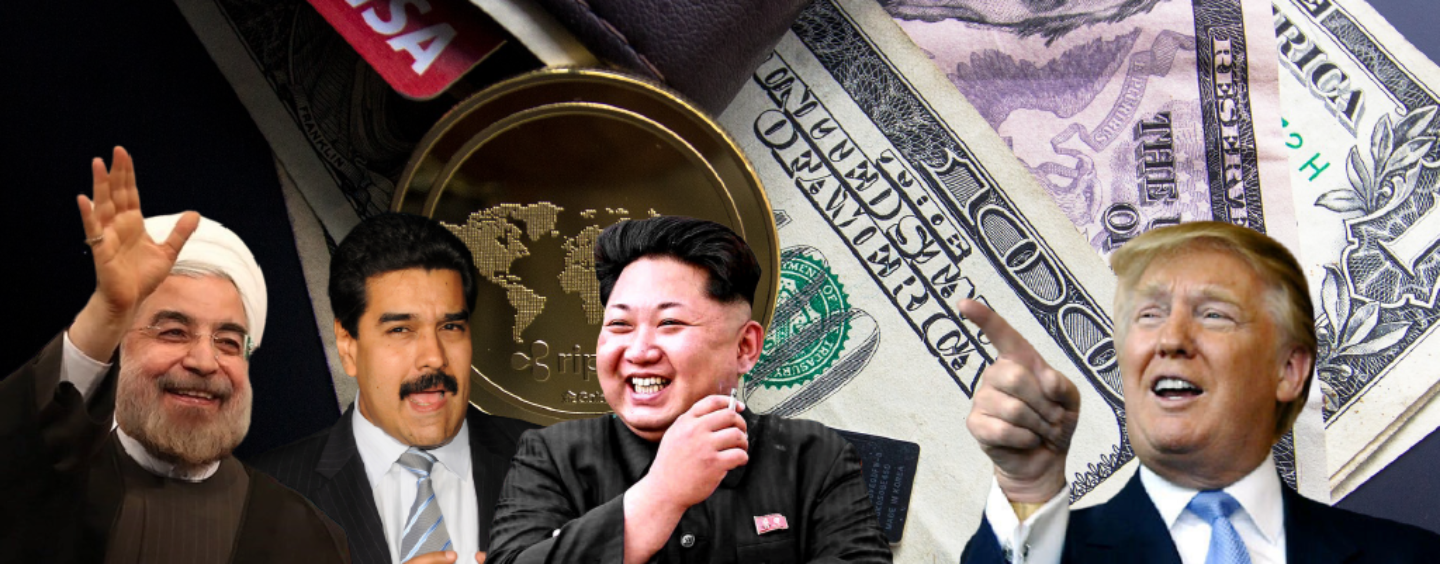
Authoritarian Regimes Turn to Cryptocurrencies to Bypass Sanctions
by Fintech News Singapore February 27, 2019It’s no secret that the Americans often use sanctions and embargoes as a political tool, faced with economic disadvantages many of these countries are increasingly turning into cryptocurrencies as a way to circumvent sanctions. These countries often include authoritarian regimes like North Korea, Venezuela and Russia.
Some sanctions imposed by the U.S. are considered almost absolute. Iran’s economy, for example, is often considered as one of those who are most threatened by these sanctions. It saw “unprecedented” economic pressure from Trump’s administration, in July 2018. For the past one year, the Iranian Rial had plunged to new lows as U.S. sanctions loom.
Iran has since sought cryptocurrencies as an alternative to evade U.S. sanctions. Last October, an Iranian general, Gholam Reza Jalali, head of Iran’s Civil Defense Organization, strongly stated that the country will soon utilize cryptocurrencies as a method to bypass international financial sanctions. He said,
“Cryptocurrencies can help bypass certain sanctions through untraceable banking operations.”
Although, Iran’s central bank earlier banned Iranian banks from dealing in cryptocurrencies over AML concerns, the country’s Informatics Services Corporation (ISC), a Central Bank of Iran affiliate body, revealed the details of the future national cryptocurrency.
It stated that Iranian national cryptocurrency is backed by rial, and is developed on the Linux Foundation-led open-source Hyperledger Fabric technology. The specifications further stated that the national crypto is developed under private blockchain infrastructure and cannot be mined.
In line with that, a group of Iranian banks have recently launched a cryptocurrency as a result of getting around economic sanctions.
Venezuela isn’t far behind. With oil-backed Petro, as its native cryptocurrency, Venezuelan officials are trying to bypass US-based sanctions imposed upon the country.
The petro was launched in December 2017 by Nicolás Maduro who was at the time President of Venezuela. The controversial cryptocurrency doesn’t seem to serve its purpose of battling hyperinflation, as there has been no indication any of Venezuela’s oil reserves that are being extracted in order to bring value to this national digital currency.
“In Venezuela, (the) new cryptocurrency is nowhere to be found”, an alarming Reuters report stated. Also, a Venezuelan computer scientist and cryptocurrency consultant Alejandro Machado, said at that time, “There is no way to link prices or exchange rates to a token that doesn’t trade, precisely because there is no way to know what it actually sells for.”
Although Maduro touted the Petro as a means to help the country right its financial goals, Venezuelans weren’t even buying the Petro. Instead, they were loading up on Bitcoin. Maduro also reacted to this by ordering banks in the country to accept Petro.
Apart from Iran and Venezuela, other regimes have also started to explore cryptocurrencies in order to combat U.S. sanctions. North Korea is earning around $15 million to $200 million by mining and selling cryptocurrencies, Priscilla Moriuchi, a former NSA cybersecurity official says.
Countries like Russia has expressed interest towards Bitcoin, last June, stating that the cryptocurrency “has its place in the world.” CryptoRuble, a state-issued crypto, is said to be launched in the middle of 2019. The government also hopes that this crypto will attract foreign cryptocurrency investments.
Featured Image Credit: Wikimedia Commons & Flickr – Source 1, 2, 3, 4







